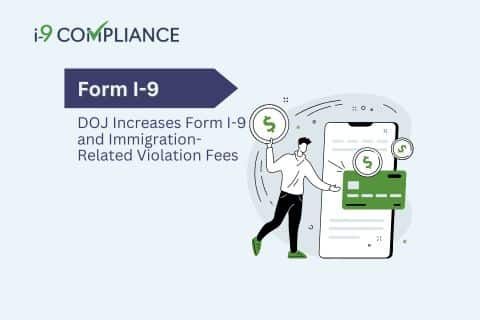DOJ Increases Form I-9 and Immigration-Related Violation Fees

Effective February 13, 2024, the U.S. Department of Justice (DOJ) adjusted the civil monetary penalties applicable for Form I-9 violations. Other adjustments also affected several key immigration-related regulations. These updated penalties will apply for violations that occur from November 2, 2015 onward.
These updates concern the penalties under the Immigration Reform and Control Act (IRCA). The changes would increase the potential costs associated with violations of immigration-related regulations. The increases would compensate for inflation in accordance with the Federal Civil Penalties Inflation Adjustment Act Improvements Act of 2015.
This Act requires agencies to adjust civil penalties for inflation under their authority and publish these adjustments in the Federal Register. Furthermore, the increases most notably affect the civil penalties concerning violations associated with the Employment Eligibility Verification (Form I-9) process. Under federal law, U.S. employers must verify the work authorization of any individual. In most cases, employers do this through the Form I-9.
Common Form I-9 violations often result in civil monetary penalties. The DOJ’s adjustments would increase the penalties. The DOJ included less severe violations, such as technical or procedural failures.
Examples of these violations include:
- Failure to ensure the employee provides the needed information such as their name, address, date of birth, and the date of completion;
- Failure to include the business name, business address, and the name, address, and signature of the preparer; and
- Failure to include the title, identification number, and expiration date for documentation provided by the employee to prove their authorization to work.
Common examples of substantive violations include:
- Failure to complete the Form I-9 for employees;
- Failure to verify the documentation associated with a form within three business days;
- Failure to reverify employment authorization on Section 3 when appropriate.
- Failure to correct a technical violation after receiving a Notice of Technical or Procedural Failures letter.
Civil penalties for violations of the IRCA will now include:
- Substantive Form I-9 violations: $281 to $2,789
- Unfair immigration-related employment documentary practices: $230 to $2,304
- Unlawful employment of aliens, first order: $698 to $5,579
- Unlawful employment of aliens, second order: $5,579 to $13,946
- Unlawful employment of aliens, subsequent order: $8,369 to 27,894
- Document fraud, first order—for violations described in U.S.C. 1324c(a)(1)–(4): $575 to $11,524
- Document fraud, subsequent order—for violations described in U.S.C. 1324c(a)(1)–(4): $4,610 to $11,524
- Document fraud, first order—for violations described in U.S.C. 1324c(a)(5)–(6): $487 to $3,887
- Document fraud, subsequent order—for violations described in U.S.C. 1324c(a)(5)–(6): $3,887 to $9,718
- Participating employer’s failure to notify of final non-confirmation of employee’s employment eligibility: $973 to $1,942
Employers should take note of these increases to Form I-9 and other immigration-related violations. They should also confirm that their policies and procedures are in place to guarantee compliance. An electronic I-9 management tool with E-Verify integration can help ensure compliance with I-9 requirements by providing step-by-step guidance, digital storage, and other features to help employers.
Ensure compliance today by switching to an electronic I-9 management tool with I-9Compliance.